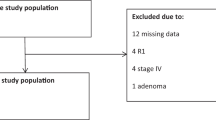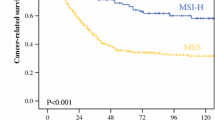Abstract
PURPOSE: The aim of this study was to investigate the genetic alterations of early-stage nonfamilial colorectal carcinomas regarding microsatellite instability, with special reference to the shape of the tumors and the site of the lesions. METHODS: Formalin-fixed, paraffin-embedded specimens of 44 early-stage nonfamilial colorectal carcinomas were examined for microsatellite instability with use of polymerase chain reaction. RESULTS: The 44 carcinomas consisted of 16 flat carcinomas and 28 polypoid carcinomas. Nineteen carcinomas were located in the proximal colon (9 flat type and 10 polypoid type), whereas 25 were in the distal colon and rectum (7 flat type and 18 polypoid type). Ten (22.7 percent) of the 44 carcinomas had at least one positive locus, whereas five (11.4 percent) of them had two or more positive loci. In the proximal colon the percentage of flat carcinomas with at least one positive locus was significantly greater than that of the polypoid carcinomas (4/9 (44 percent)vs. 0/10;P=0.04). Six patients had synchronous or metachronous colorectal carcinomas or both. They harbored microsatellite instability more frequently than patients with single colorectal carcinomas, and the differences were statistically significant (P<0.02). CONCLUSIONS: These data suggest that in nonfamilial carcinomas in the proximal colon, the genetic pathway in flat carcinomas may be different from that in polypoid carcinomas.
Similar content being viewed by others
References
Vogelstein B, Fearon ER, Hamilton SR,et al. Genetic alterations during colorectal-tumor development. N Engl J Med 1988;319:525–32.
Fearon ER, Vogelstein B. A genetic model for colorectal tumorigenesis. Cell 1990;61:759–67.
Cawkwell L, Quirke P. A new class of colorectal cancer gene. Gut 1995;36:641–3.
Adachi M, Muto T, Morioka Y, Ikenaga T, Hara M. Flat adenoma and flat mucosal carcinoma (b type): a new precursor of colorectal carcinoma? Report of two cases. Dis Colon Rectum 1988;31:236–43.
Kuramoto S, Oohara T. Flat early cancers of the large intestine. Cancer 1989;64:950–5.
Kojima M, Konishi F, Tsukamoto T, Yamashita K, Kanazawa K. Ki-ras point mutation in different types of colorectal carcinomas in early stages. Dis Colon Rectum 1997;40:161–7.
Soh K, Yanagisawa A, Hiratsuka H, Sugano H, Kato Y. Variation in K-ras codon 12 point mutation with histological atypia within individual colorectal tumors. Jpn J Cancer Res 1993;84:388–93.
Yamagata S, Muto T, Uchida Y,et al. Lower incidence of K-ras codon 12 mutation in flat colorectal adenomas than in polypoid adenoma. Jpn J Cancer Res 1994;85:147–51.
Fishel R, Lescoe MK, Rao MR,et al. The human mutator gene homolog MSH2 and its association with hereditary nonpolyposis colon cancer. Cell 1993;75:1027–38.
Bronner CE, Baker SM, Morrison PT,et al. Mutation in the DNA mismatch repair gene homologuehMLH1 is associated with hereditary non-polyposis colon cancer. Nature 1994;368:258–61.
Peltomäki P. Microsatellite instability and hereditary non-polyposis colon cancer. J Pathol 1995;176:329–30.
Loeb LA. Microsatellite instability: Marker of a mutator phenotype in cancer. Cancer Res 1994;54:5059–63.
Chung DC, Rustgi AK. DNA mismatch repair and cancer. Gastroenterology 1995;109:1685–99.
Aaltonen LA, Peltomäki P, Leach FS,et al. Clues to the pathogenesis of familial colorectal cancer. Science 1993;260:812–6.
Thibodeau SN, Bren G, Schaid D. Microsatellite instability in cancer of the proximal colon. Science 1993;260:816–9.
Ionov Y, Peinado MA, Malkhosyan S, Shibata D, Perucho M. Ubiquitous somatic mutations in simple repeated sequences reveal a new mechanism for colonic carcinogenesis. Nature 1993;363:558–61.
Konishi M, Kikuchi-Yanoshita R, Tanaka K,et al. Molecular nature of colon tumors in hereditary nonpolyposis colon cancer, familial polyposis and sporadic colon cancer. Gastroenterology 1996;111:307–17.
Aaltonen LA, Peltomäki P, Mecklin JP,et al. Replication errors in benign and malignant tumors from hereditary nonpolyposis colorectal cancer patients. Cancer Res 1994;54:1645–8.
Kim H, Jen J, Vogelstein B, Hamilton SR. Clinical and pathological characteristics of sporadic colorectal carcinoma with DNA replication errors in microsatellite sequences. Am J Pathol 1994;145:148–56.
Cawkwell L, Li D, Lewis FA,et al. Microsatellite instability in colorectal cancer: improved assessment using fluorescent polymerase chain reaction. Gastroenterology 1995;109:465–71.
Samowitz WS, Slattery ML, Kerber RA. Microsatellite instability in human colonic cancer is not a useful clinical indicator of familial colorectal cancer. Gastroenterology 1995;109:1765–71.
Lothe RA, Peltomäki P, Meling GI,et al. Genomic instability in colorectal cancer: relationship to clinicopathological variables and family history. Cancer Res 1993;53:5849–52.
Shibata D, Peinado MA, Ionov Y,et al. Genomic instability in repeated sequences is an early somatic event in colorectal tumorigenesis that persists after transformation. Nat Genet 1994;6:273–81.
Rubio CA, Kumagai J, Kanamori T, Yanagisawa A, Nakamura K, Kato Y. Flat adenomas and flat adenocarcinomas of the colorectal mucosa in Japanese and Swedish patients: comparative histologic study. Dis Colon Rectum 1995;38:1075–9.
Muto T, Kamiya J, Sawada T,et al. Small “flat adenoma” of the large bowel with special reference to its clinicopathologic features. Dis Colon Rectum 1985;28:847–51.
Zhuang Z, Bertheau P, Emmert-Buck MR,et al. A microdissection technique for archival DNA analysis of specific cell populations in lesions <1 mm in size. Am J Pathol 1995;146:620–5.
Lindblom A, Tannergard P, Werelius B, Nordenskjold M. Genetic mapping of a second locus predisposing to hereditary non-polyposis colon cancer. Nat Genet 1993;5:279–82.
Hemminki A, Peltomaki P, Mecklin JP,et al. Loss of the wild type MLH1 gene is a feature of hereditary nonpolyposis colorectal cancer. Nat Genet 1994;8:405–10.
Boland CR, Sato J, Appelman HD, Bresalier RS, Feinberg AP. Microallelotyping defines the sequence and tempo of allelic losses at tumour suppressor gene loci during colorectal cancer progression. Nat Med 1995;1:902–9.
King BL, Carcangiu M-L, Carter D,et al. Microsatellite instability in ovarian neoplasms. Br J Cancer 1995;72:376–82.
Morson BC, Dawson IM. Morson & Dawson's Gastrointestinal Pathology. 3rd ed. Oxford: Blackwell Scientific Publications, 1990:574–6.
Sengupta SB, Yiu CY, Boulos PB, De Silva M, Sams VR, Delhanty JD. Genetic instability in patients with metachronous colorectal cancers. Br J Surg 1997;84:996–1000.
Author information
Authors and Affiliations
Additional information
Read at the meeting of The American Society of Colon and Rectal Surgeons, Seattle, Washington, June 9 to 14, 1996.
About this article
Cite this article
Okamoto, T., Konishi, F., Kojima, M. et al. Significance of microsatellite instability in different types of early-stage nonfamilial colorectal carcinomas. Dis Colon Rectum 41, 1385–1391 (1998). https://doi.org/10.1007/BF02237054
Issue Date:
DOI: https://doi.org/10.1007/BF02237054




